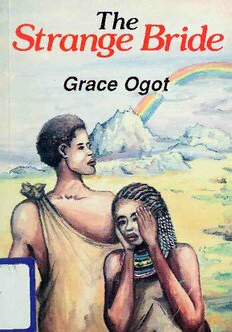Table Of ContentStrange Bride
Grace Ogot
-^
%^
^^it^iii^
\
BOSTON PUBLICUBRARY
Copley Square
THE STRANGE BRIDE
GRACE OGOT
Translated from Dholuo by Okoth Okombo
East African Educational Publishers Ltd.
Nairobi
Published by
East African Educational Publishers Ltd.
Brick Court
Woodvale Grove/Mpaka Road
Westlands
P.O. Box 45314
Nairobi
©Grace Ogot 1989
First published in 1983 as Miaha
Reprinted 1993
ISBN 9966-46-865 -X
r-i
OGOT I
Printed by
General Printers Ltd., Homa Bay Road,
P.O. Box 18001, Nairobi, Kenya.
G9701
Digitized by the Internet Archive
in 2011
http://www.archive.org/details/strangebrideOOgrac
Chapter One
Inthedistantancestraldays,ourgod.WereNyakalaga,livedonthe
earthwithhisownpeople.Butnoonecouldseehimbecausehewas
amysteriousbeingwhoseessencespreadalloverthesurfaceofthe
earth.
However,even thoughpeoplecould notseeWereNyakalaga,
they were aware of his closeness to them. They saw his hand in
lightning and heard hisvoice in thunderand the winds thatblew
around them.
PeoplebelievedthatWereNyakalagalikedtoliveinthemoun-
—
tains.Theythereforebuilthimasmallshrine witharoofthatched
—
withthebuoywegrass atthepeakofGotOwaga.Fromthere,they
believed.WereNyakalagawasabletolookafterallhispeoplewho
lived inthebigvillage that surrounded the mountain.
In those days there were no cows. People fed on crops like
sorghum,millet,sesameandvariouskindsofbeans.Thecropswere
grownonlargepiecesoflandthatWereNyakalagahadgiventohis
people. Since-thebigvillage wasbuiltaround themountain,large
farmsextendedfromthefootofthemountaindowntothebanksof
theriversthatsurroundedthemountainalittlefartherdown.There
—
were fantasticharvestsofsorghum especiallytheredochutiand
the white andiwo. There were also very good harvests of finger
millet, nyim (sesame), peasand beans.
ButthegreatestwonderofthosedayswasthatthepeopleofGot
Owaga did notworktocultivatetheirfields.WereNyakalagahad
giventhemanautomaticmetalhoethatwoulddoallthecultivation
theyneededaslongastheykeptgod'scommandmentsgoverning
theuseofthathoe.Sincetheydidnotdoanyexhaustingwork,these
peoplestayedyoungforalongtimeandlivedmuchlongerthanthe
people of today. For this great favour, the people of Got Owaga
remained veryclose to theirgod, obeyingall hiscommandments,
and alwaysactingaccording to hiswill.
OneoftheeldersofthepeopleofGotOwagawasannancalled
Olum Ochak. This man was very healthy, and he was extremely
handsome.Hehadashiny,blackskinthatlookedwonderfulwhen
1
decorated with chalk and ochre. He was tall, with a proportional
frame,andverywhiteteeth,whichmadehissnulereallycharming.
Thiswas theman that thepeopleofGotOwaga made theirchief.
Olum Ochak wasa strong chief who had a lot of love for his
people.Moreover,hewasagreatbelieverinjustice;andhepassed
allhisjudgementswithoutfavourorprejudice.Forthatreason,his
peopleliked himvery much, and theyhada lotoffaith inhim.
Hisfirst,and therefore seniorwifewascalled Lwak,meaning
'motherofthenation'. Herfatherwascalled Kwang'a.
Lwak was of dark-brown complexion. She was of medium
heightandhadshortcurlyhair.Therewasnotasinglegreyhairon
herhead.
OlumOchaklovedLwaksomuchthatheneveraddressedher
—
byhername. He alwayscalled herRagwel thebow-legged one
(traditionally,bow-leggedwomenareconsideredverybeautifulby
Luo men)orNyargiThuondi(daughterof the heroes).
OlumOchak'sdutiesasa chiefwerebothadministrativeand
religious. Every morning,at day-break, he climbed to thepeakof
Mt.Owagatopayhon\agetoWereNyakalagawhentheeyeofthe
sun first shone over the mountain to wake up the mortals, who
believed that the power ofWereNyakalaga wasexpressed inthe
heatandthedazzlingraysofthesun.Thustheyreferredtothesun
as"theeyeofWereNyakalaga".So,whenthesunmadeitsmagnifi-
cent appearance over the horizon, Olum Ochak would spit in its
direction, saying:
"Thu! May you bring good to us, and may your eye shine
blessingsonusforthewholeofthisday."
After that he came back home and waited until the evening
whenhewentbacktothepeakofthemountain.Atsunset,whenthe
sunturned red,hebid itfarewellbyspitingand saying:
"Thu! Maypeacebewithusuntil weseeyoureyeagainwhen
you wake uptomorrow."
ThepeopleofGotOwagabelievedthatOlumOchakhadsome
charisn\a which made their loyalty to him spontaneous.When he
arrived atapublicgathering, hispeoplesettleddownquitelyand
gavehimtheirattention withoutbeingcommanded todo so.
They also believed that he had some supernatural ability by
whichheinterpretedthemessagesthatWereNyakalagasentthrough
thunder,windsand the songsofthebirds. Hecouldalsoread the
secrets that were carried by the clouds, the nK)on, and the stars.
Aboveall,hewasageniusatinterpretingdreams.
As time wentby the peopleofGotOwaga started to call him
WereOchak, and, with time, his other nameOlum, disappeared
andhewasonlyknownasWereOchak(whichmeantthathewas
thefirstrulerofthenation).
WereOchakand hiswife, Lwak, hadonlytwomalechildren.
TheelderonewascalledOpii.Hewasofmediumsizeandinherited
his mother's dark-brown colour. But he was aggressiveand very
short-tempered.
Opii'swifewascalled Achola. Herfather'snamewasAdede.
Achola was a tall girl with a graceful neck. She too was of dark-
browncomplexionandhadshortcurlyhair.Shewasaquiet,polite
girl,and thisnudeherthemostsuitablewomanforOpii.
There was a big difference between Opii and his younger
brother, Owiny. The people of Got Owaga reckoned that it was
Owiny who had taken after his father. In him, they saw all the
qualitiesofhisfather.HewastaUand strong,withmuscularanns.
LikehisfatherhehadasnrKX)th,shiny,blackskinandsnow-white,
closely-and-unifonnly-spacedteeth.Hewasfriendlyandsociable,
andhealwaysplayedtheroleofapeacemakeramonghispeers.For
thatreason, hispeersliked him somuchthat theyaddressedhim
fondlyasBadeDongo(Theonewithmusculararms).
AlthoughOpii andOwinydid nothavemuchinconrunon, in
termsoftheirnaturalendownnents,theystilllikedeachothervery
much.Theycoo()eratedquitewellinhelpingtheirfatherlookafter
hisquail.ThebirdscameingreatnumberstoGotOwagaafterthe
harvest.Theywerecaughtanddomesticated.Opiiwasparticularly
goodattrappingthebirdsandmakingcagesforthem.AndOwiny
wasverygoodattrappingants,whichwereusedtofeedhisfanuly's
largeflockofchicken.
JustasOwinywasgpodattrappingants, sowasheatrearing
chicken,whichhisfatherbartered forsorgum,beansorsesanne.
Each morning, while Were Ochak went to the peak of Mt.
Owaga to pray and pay homage to the sun as it rose above the
horizon, Opii and Owiny, his brother, went to erect the n^st on
whichtheirquailwerecaged,afterwhichtheyproceededtosetthe
trapssoastocatchmorequail.Thentheyreturnedhometowaitfor
their father to comeback from the mountain.
Whentheirfathercan\eback,theirmother,Lwakwould pour
someporridgeintoa red mbiru and giveittoOpii'swifetotake to
theshadeofthebigsialatree,whereWereOchakusedtomeetthose
who called on him. That was also where he always had breakfast
with his sons.
After breakfast, Owiny attended to their chicken. He left his
brother, Opii, to help their father make the cages for the quail or
make the osemi under which thechicken were kept (especially,at
night). Meanwhile, he himself went to collect theants that he had
trapped the previous evening at the foot of an anthill. As he was
successfulinalmosteverythingthathetriedhishandson,whenhe
trappedantshecaughttheminlargenumbers.Sometimes,hecould
catch upto threebasketfuls.
Lwak was very happy with Owin/s talents. She had noticed
right from Owin/schildhood that his talentscould bring wealth
and glorynot only to her fanulybut even to all the people ofGot
Owaga. She, therefore, created a friendly relationship between
OwinyandOpii'stwosonssothattheycouldaccompanyhimwhen
hewent to traporcollectants. ButLwak did not fullyunderstand
howbeneficial thisrelationship wasgoingtobe to thosechildren.
Thetwoboys' nameswereOchieng' and Oyoo. Ochieng' was
eight harvests old, and Oyoo was six harvests old. Both of them
wereactiveandintelligentchildren.Sincetheyweresofondoftheir
uncle,Owiny,hisworkoftrappingandcollectingantsalsobecame
theirfavouriteactivities.Theywouldalwaysaccompanyhimtohis
ant-traps,andall theirdreamswereabouttrappingandcollecting
ants.
Soon, Owiny had shown them all the shrubs that ants liked
eating,andtheyheljDedhimbyfindingthoseshrubswhilehecutthe
grasswhich theyused tocover theshrubsinanant-trap.
Aftercollectingtheantsfromthetraps,thethreeofthemwent
back home,eachcarryinga heavy load ofants. Theyleft theholes
inwhichtheantsweretrappedopentodryupuntilevening,when

